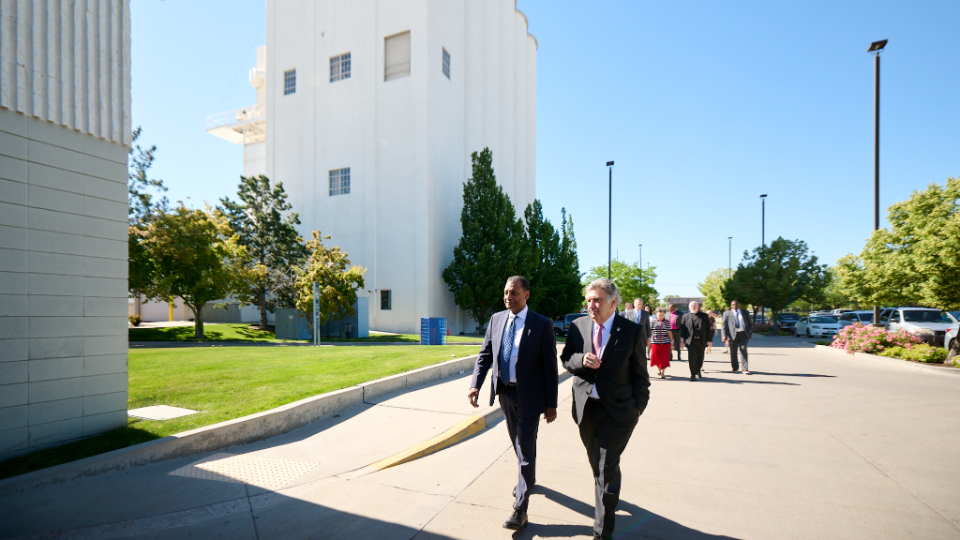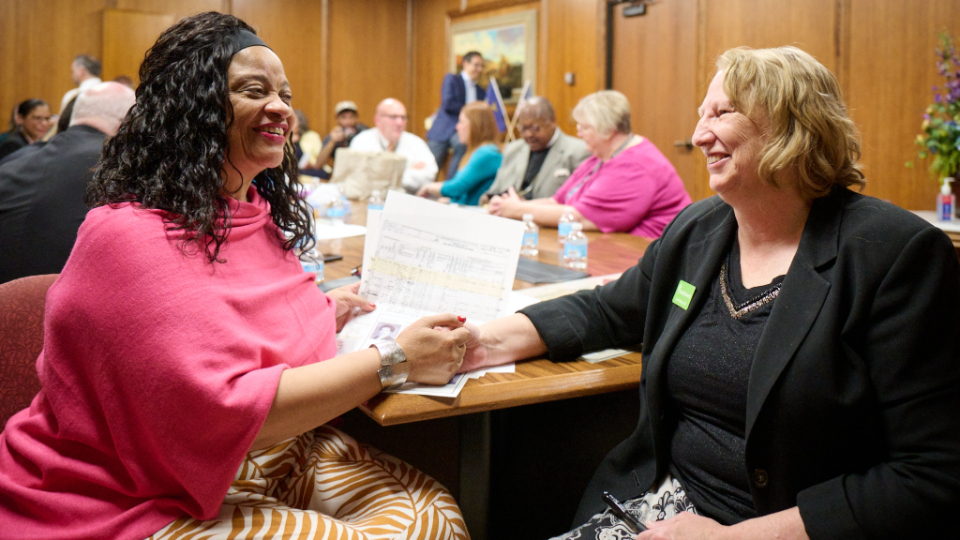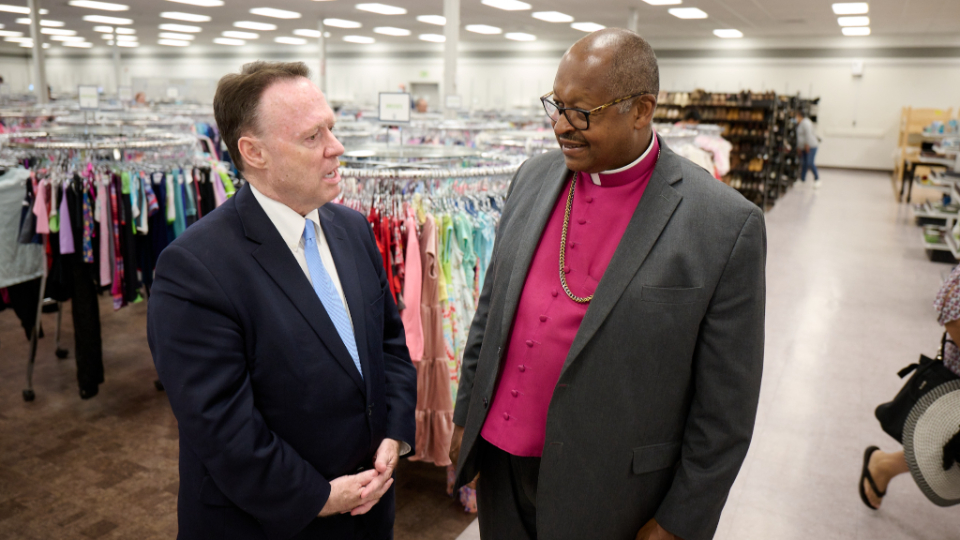“Hearing is not like seeing.”
Those words, spoken Thursday by Rabbi Joseph Potasnik of New York, aptly describe why seven faith leaders from the Big Apple visited Utah on Wednesday and Thursday. They saw firsthand the beating heart of the welfare and humanitarian work of The Church of Jesus Christ of Latter-day Saints. They learned more about their genealogy at the Family History Library. They met with Church leaders. And they spoke at Brigham Young University’s annual religious freedom conference.
-
- NY-Commission-of-Religious-Leaders-OFP
- NY-Commission-of-Religious-Leaders-OFP
- NY-Commission-of-Religious-Leaders-OFP
- NY-Commission-of-Religious-Leaders-OFP
- NY-Commission-of-Religious-Leaders-OFP
- NY-Commission-of-Religious-Leaders-OFP
- NY-Commission-of-Religious-Leaders-OFP
- NY-Commission-of-Religious-Leaders-OFP
- NY-Commission-of-Religious-Leaders-OFP
- NY-Commission-of-Religious-Leaders-OFP
- NY-Commission-of-Religious-Leaders-OFP
- NY-Commission-of-Religious-Leaders-OFP
- NY-Commission-of-Religious-Leaders-OFP
- NY-Commission-of-Religious-Leaders-OFP
- NY-Commission-of-Religious-Leaders-OFP
- NY-Commission-of-Religious-Leaders-OFP
- NY-Commission-of-Religious-Leaders-OFP
- NY-Commission-of-Religious-Leaders-OFP
| Temple Square is always beautiful in the springtime. Gardeners work to prepare the ground for General Conference. © 2012 Intellectual Reserve, Inc. All rights reserved. | 1 / 2 |
Quentin L. Cook of the Quorum of the Twelve Apostles called the delegation’s visit to Utah “very significant.”
“We find people that have come to these events, and it has enriched them, and they've gone back and they've been an influence for religious freedom,” Elder Cook said.
Elder Cook said it’s also religious freedom that allows Latter-day Saint missionaries to serve around the world. “If you don't have religious liberty, you can't go to the world. … You're not allowed to talk in the public square. You're not allowed to talk to people on the street. You're not allowed to share that message.”
“It’s one of the great, great moments in my life when I get to meet people who are so committed to the cause,” Rabbi Potasnik said. “It’s easy to preach it. But people say you have to see a sermon. We’ve seen many sermons out here on this visit.”
Rabbi Potasnik, a senior rabbi and vice president of New York City’s Commission of Religious Leaders, was joined by four commission members: Commission President and Founder of the Christian Cultural Center in Brooklyn, Rev. A.R. Bernard; Rev. Que English, director of the Partnership Center of the U.S. Department of Health and Human Services; Monsignor Kevin Sullivan, executive director of Catholic Charities of the Archdiocese of New York; and Bishop Dr. Victor A. Brown, senior pastor of Mt. Sinai United Christian Church in Staten Island. The group was joined by Rabbi Diana Gerson, associate executive vice president of the New York Board of Rabbis, and Annette Bernard, executive director of Community Affairs of the Christian Cultural Center.
Welfare Square
At Welfare Square, the faith’s largest concentration of facilities that benefit the poor, Rev. Bernard saw the source of the 40,000 pounds of food the Church of Jesus Christ gave to his church in March 2022.
“What impressed me most is the fact that you’re not just engaged in distribution but actually production,” Rev. Bernard said. “That was intriguing. The dairy farms, peaches, peanuts, grapes, cheese. I was just amazed.”
The Rev. also expressed admiration for the Church’s ethos of volunteerism.
“The culture of missions that you’ve created that results in volunteers giving their time and their talent to a cause I think is also amazing,” Rev. Bernard said. “The whole missions culture that you’ve created in the Church — it speaks to what you’re able to accomplish globally.”
Rabbi Gerson said the aroma of tomato sauce being produced at Welfare Square pointed her to a larger truth about solidarity.

20220616_115044_LNilsson_LES_5658.jpg
Christian Cultural Center Founder Rev. A.R. Bernard (left) and Rabbi Joseph Potasnik (right), both of New York, tour Welfare Square in Salt Lake City on Thursday, June 16, 2022.2022 by Intellectual Reserve, Inc. All rights reserved.“You can smell the sauce and it transports you to a different time and a different place that has absolutely nothing to do and everything to do with this moment,” Rabbi Gerson said. “You realize the power of the emotion of this is hope, is faith, is God. It’s bigger than all of us, and yet it connects us all together.”
Family History Library
The visit to the Family History Library was, for many in the group, a beautiful revelation into their roots. Rev. English had never known her maternal grandfather’s birthdate. He was a slave on a plantation. On Wednesday, Family History Department staff presented her with a handwritten document from an ancestor that had the names of her grandfather’s children.
“I had no idea that [visiting the Family History Library] would put me on a journey to know so much more about my family,” Rev. English said. “I’m at a point now where we’re going to be able to dig deeper. And that’s the joy in being able to create and preserve that online for my generations to come that can see that in real time.”
Monsignor Sullivan noticed the global nature of the records at the Family History Library. This, he said, is a reminder of the need to work together for the good of the globe.
“The world we live in is getting smaller,” Monsignor Sullivan said. “[Collaborating] in solidarity with other people whose cultures might be very different, whose religion might be very different, is really key to the future success and survival of the human race.”

20220615_191912_LNilsson_LES_4214.jpg
Rev. Que English (left), director of the Partnership Center of the U.S. Department of Health and Human Services, reacts to information about her family tree with an employee at the Family History Library on Temple Square on Wednesday, June 15, 2022.2022 by Intellectual Reserve, Inc. All rights reserved.In our time of division, Bishop Brown said it is refreshing to see institutions such as the Church of Jesus Christ that are committed to serving the poor and bringing people together.
“This truly is the incarnated reality of the mission and spirit of Jesus Christ,” Bishop Brown said. “In this dispensation, our role and task and responsibility is that of being the hands and feet of Jesus. … We are called to be instruments of service. And so, we have not been saved to sit — we’ve been saved to serve. And that’s what we should be doing. And what I saw this morning is an incarnation of the mission of Jesus Christ on a level I’ve never seen it before. So I’m incredibly blown away.”
BYU Religious Freedom Conference
At the BYU religious freedom conference Thursday night, Elder Quentin L. Cook of the Quorum of the Twelve Apostles moderated a panel discussion between CORL members Rev. Bernard, Rabbi Potasnik, Rev. English and Elder David L. Buckner, an Area Seventy in the Church of Jesus Christ.
The panel explored how religious partnerships can create stronger societies.
One of those partnerships — and one that can be a model for others — is the work that CORL does in New York City. Elder Buckner told the BYU audience of his first experience as a CORL member. The committee chair, Cardinal Timothy Dolan, had Elder Buckner sit next to him.
“[He] invited me to sit right by him, immediately introducing me and then, almost as if it were choreographed — which it wasn’t — we were family,” Elder Buckner said.

20220616_120036_LNilsson_LES_5896.jpg
Elder David L. Buckner, an Area Seventy in the Church of Jesus Christ, accompanies Bishop Dr. Victor A. Brown, senior pastor of Mt. Sinai United Christian Church in Staten Island, during a tour of a Deseret Industries store in Salt Lake City on Thursday, June 16, 2022. Both Elder Buckner and Bishop Brown are members of New York City’s Commission of Religious Leaders.2022 by Intellectual Reserve, Inc. All rights reserved.That first meeting was a wakeup call, Elder Buckner said. CORL leaders were discussing complex, difficult issues. Importantly, they wanted to hear the opinions of everyone at the table — including his.
“I remember Rev. Al Sharpton saying something to the effect of, ‘Elder Buckner, we might be in different ships, but we are in the same storm,’” Elder Buckner said. “And it was at that moment that I realized that this table was not only inclusive, but it counseled together.
“As a member of The Church of Jesus Christ of Latter-day Saints,” Elder Buckner continued, “I had been trained a million times on counseling. And I had never seen it as effective as I saw it at that table where voices were heard.”
Panelists encouraged people of faith everywhere in the U.S. to be a leavening influence in society.
“I serve in government,” Rev. English said, “and I am shocked about how many government offices do not have an interfaith table. I want to encourage you in your own respective cities and states to look at ways to be a bridge builder in your [communities].”
“When you have a belief system that is strong and you don’t back off, you don’t run, I think you can inspire a lot of people,” Rabbi Potasnik said. “And government will listen to you because they know that you reach people.”
‘We’re Family’
Rev. English said everything she saw during her visit to Church headquarters “is so embodied in God’s love. The atmosphere, the motivation for why you do what you do is such a beautiful expression of God’s love. And for me, that’s everything.”
Rabbi Potasnik, whose association with Church leaders began in 2009, thanked them for the opportunity to deepen their relationship.
“I remember when I was much younger, if you would go to an event, on the ticket it would say ‘no good if detached,’” Rabbi Potasnik said. “That’s a lesson for us. We’re not going to be as good as we could be if we’re detached from one another. … When we see one another, it brings us closer. We all say in our houses of worship that we’re family. Well, we need to behave like family. That’s why we need to spend more time with each other.”
